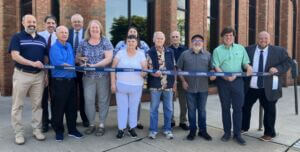SBDC Receives National Honor
Video courtesy of WNEP.com
Congratulations to the Bucknell Small Business Development Center, recipient of the U.S. Small Business Administration's 2024 Excellence & Innovation Award. The award presentation, which took place Tuesday, April 30, at the Campus Theatre in Lewisburg, was part of a national celebration of "National Small Business Week," and recognized the Bucknell SBDC team for the excellence of their work in assistance to small businesses in the region.
For more information or assistance for your Montour County-based small business through the Bucknell SBDC's programs and consulting services, visit https://www.pasbdc.org/bucknell/. For assistance in Columbia County, visit the Wilkes University SBDC, here: https://www.pasbdc.org/wilkes/
Member News

Columbia County Historical and Genealogical Society Cuts the ribbon on new location
On May 1st the Columbia County Historical and Genealogical Society cut the ribbon on their new location at the the corner of Market and Main Streets in Bloomsburg. Congratulations!
38th Annual Spring Fling Happening May 4th
Held the first Saturday in May, Danville's 38th Spring Fling is a celebration of the foods, shopping, and sounds that make it a special place. The all-ages outdoor event features over 200 downtown and area businesses, food trucks, craft vendors selling their handmade wares; activities for the kids, and entertainment on the Canal Park stage. Mark your calendars & don't miss the food, drink, music, arts, shopping and fun in downtown Danville on Saturday, May 4th from 9am-4pm.
Celebration Villa Hosting Open House May 16th
Join Celebration Villa of Berwick for an open house May 16th. There will be tours, entertainment and refreshments. Learn more!
4th Annual First Keystone Community Bank Teacher Appreciation Award Nominations open now
Do you know a teacher who has truly inspired you or your child? First Keystone Community Bank will be recognizing one teacher from each of the areas they serve; Columbia County, Montour County, Monroe County, Luzerne County, and Northampton County. Nominate them by completing the application and briefly telling us how they have impacted your life (or your child’s life) and why they deserve this recognition. The deadline for submission is Thursday, May 9th at 5:00 pm via email to etepper@fkc.bank or by dropping it off at any of their branch locations.
Fromm Appoints Leo Francis Vice President of Construction Sales
Fromm, an independent electrical distributor in the Mid-Atlantic Region, announced the appointment of Leo Francis Vice President of Construction Sales. Learn More about Leo's Appointment.
Best of the Best Nominations open until May 5th
The Press Enterprise's Annual Best of the Best Nominations are open until May 5th. Click here to start nominating your favorite area businesses!
Apollo Point Apartments hosting Car Show May 18th
Saturday, May 18th Apollo Point Apartments is hosting a car show. The event starts at 10:00 and will have several car categories, food, and more!
Glen Brook Rehabilitation and Healthcare Center Car Show May 19th
Join Glen Brook Rehab at their 2nd Annual Car Show Sunday, May 19th from 11 am-3 pm. They will be having food trucks, music, prizes, craft vendors, and so much more! For any questions, please contact Maria Fazio at (570) 204-8308 or mfazio@glenbrookrhc.com.
Painting for Prevention Program Art now on Display
Susquehanna Valley United Way’s Parents as Teachers Program, along with Geisinger Unity Group, Columbia County Family Center, Nurse-Family Partnership, and the PA Family Support Alliance have all joined forces to raise awareness for National Child Abuse Awareness Month through Painting for Prevention. The families they serve painted canvas that are now on display across the 5-county region! Learn more.
Sean-Black State Farm Insurance Agent Photo contest
Have you entered yet? This year's categories are People, Nature, Places, and Miscellaneous. Limit one entry per category. Submissions must be sent to stephanie@insureberwick.com by May 17 at 8 p.m. to be considered!
Women's Giving Circle hosting "On the Bright Side", May 8th
The Women's Giving Circle will hold its next "On the Bright Side" virtual lunch session on Wednesday, May 8th at noon. Hear from three organizations impacting the lives of women and children across the region. Click here to register for the May 8th session.
Bloomsburg Public Library will sponsor a Braver Angels Skills for Disagreeing Better Workshop on May 4, 2024
On May 4, 2024, from 2 to 3:30 p.m., at Bloomsburg Public Library, 225 Market Street, Bloomsburg, Braver Angels will hold a workshop designed
to teach skills for having political conversations across the divide. To learn more and to register click here.
Wilkes Small Business Development Center has moved
The Wilkes University SBDC has moved to a new location. Please update your records to their new address at: Wilkes University Small Business Development Center, 169 South Main Street, Wilkes-Barre, PA 18701. Their phone number and website have all remained the same.
Workshop Series for Nonprofits in Columbia County
As part of the Columbia County Rural Placemaking Innovation Challenge, a series of workshops will be held for nonprofits in May and June. See the flyer for dates and topics, and visit the project website for more descriptions/locations/times. These workshops are free to all Columbia County nonprofit employees, so please share with anyone you think might be interested.
Bucknell SBDC Hosting Workshop
In this in-person workshop happening May 7th will introduce the Entrepreneur's Prompt Toolkit, a curated collection of prompts for AI tools like ChatGPT to empower small business owners. Prompts will facilitate product development, marketing, human resources, legal compliance, and finance and accounting. Chamber members get a discount on the registration fee of $15!
CSIU offering SYNCH Training
Community Health Workers are instrumental in increasing equitable access to healthcare in underserved communities across Pennsylvania. The SYNCH CHW Training Program, administered by the CSIU, still has funding for individuals who want to make a difference in the lives of others and are new to the field of community health. Find out more on the SYNCH Program Website or call (570) 246-5902.
PPL Electric Utilities customers to see lower supply charge heading into summer cooling
PPL Electric Utilities customers who don’t shop for electricity supply will see a drop in their supply price starting June 1, 2024. The supply charge is included in the Price to Compare (PTC) and passed along to customers without markup. Learn more.
Central Susquehanna Opportunities hosting two resource fairs
CSO is planning a Resource Fair for both Bloomsburg and Berwick. The Bloomsburg event will be held on Tuesday, May 28th, 9am - 12pm, and the Berwick event on Thursday, May 30th, 11am - 2pm. Please see flyers for more information and coordinator contact information to sign up to participate. CSO is also in the process of gathering information for their community needs assessment. Fill out that survey here. This survey will be open through April 30, 2024.
DCDC the Big 5-0 Fest happening May 16th
Join DCDC for delicious food, live music/entertainment and an opportunity to be part of our aerial photo standing in the shape of a 5-0 courtesy of Virstudio360. Learn more.
Washingtonville 10th Annual Beautification Day
Saturday, May 18th the Washingtonville Borough Council, Washingtonville Revitalization Committee, and the Jane D. Delong Memorial Hall Association will be hosting a beautification day and needs volunteers to help with several projects. Find a full list of projects and more details here.
Servpro of Columbia, Montour & Sullivan Counties offering CE classes
5 CE classes will be offered by Servpro of Columbia, Montour & Sullivan Counties. Get the full schedule.
Compassus hosting Health & Wellness Expo at Apollo Point June 12th
Door prizes, Giveaways, and tours will all be apart of a Health & Wellness Expo Compassus is hosting at Apollo Point Apartments. Get more information here.
Berwick Historical Society Revealing Nanny's Room
May 25th the Berwick Historical Society will be revealing Nanny's room. The only domestic help to live with the Jackson family in the mansion was Helen Jameson or as the family called her - Maggie. Her room is being sponsored by Marilyn Gibbons in memory of her husband Joseph Gibbons and in honor of their children. Learn more.
BOOM Camps happening
Better Orientation Onboarding & Mentoring (BOOM) Camps will be hosted free and online April - July. Get dates, session topics and to register by clicking here.
Penn College to host Baja SAE Competition in May
Baja SAE challenges engineering students to design and build an off-road vehicle that will survive the severe punishment of rough terrain and in some competitions, water. Penn College will host a Baja SAE international competition, May 16–19, 2024, at the Schneebeli Earth Science Center’s heavy construction equipment operations training site. Learn more about sponsorship opportunities for the BAJA SAE Williamsport and ways to support the team.
3rd Annual Recovery Picnic Happening June 13
Bringing the community together to uplift and support those in recovery and celebrate the dedication of service providers and community members who make recovery in all its forms possible. Learn more and RSVP here.
Save the Date for Agapepalooza
Save the Date for Agapepalooza July 20th, 2024. This is a day of free fun for the whole family with activities, local vendors, and food. Learn more.
PA Chamber Gives Overview of Overtime Eligibility Rule
Source: PA Chamber of Business and Industry
 The U.S. Department of Labor issued a rule last week that could have significant implications for how employers in Pennsylvania comply with overtime requirements.
The U.S. Department of Labor issued a rule last week that could have significant implications for how employers in Pennsylvania comply with overtime requirements.
The rule, announced last Tuesday, increases the salary threshold required to exempt workers from overtime pay. The federal Fair Labor Standards Act requires employers to pay overtime, or time and half, to eligible workers for any hours worked beyond 40 in a week.
Specifically, the rule increases the required minimum salary level for an overtime-exempt employee from $35,600 to $43,900 effective July 1, 2024, and then to $58,700 by the beginning of 2025. The rule also provides for the automatic increase of this threshold every three years based on wage data.
According to the White House, this rule is expected to expand overtime eligibility to an additional four million people by January 1, 2025, although a legal challenge is likely forthcoming.
Previous attempts to expand overtime eligibility were defeated by legal challenges motivated by pushback from employers and some impacted employees. Many employers who cannot afford the costs associated with paying overtime are forced to convert salaried employees to hourly status, in which employees must clock in and out to track their time and ensure they do not exceed 40 hours in a week.
In 2016, the Obama administration proposed a similarly significant expansion which was struck down by an Obama-appointed federal judge following a lawsuit filed by the U.S. Chamber. Additionally, the PA Chamber led a successful effort in 2020 to repeal a Pennsylvania-specific overtime expansion proposed by then-Gov. Tom Wolf.
To access the final rule, please click here.
###
Founded in 1916, the Pennsylvania Chamber of Business and Industry is the state's largest broad-based business association, with its membership comprising businesses of all sizes and across all industry sectors. The PA Chamber is The Statewide Voice of BusinessTM.
9 Essential Retail Marketing Strategies for 2024
- Optimize your online presence with accurate, up-to-date information and a Google Business Profile.
- Employ strategic sales and loss leaders to drive foot traffic and highlight product range.
- Create captivating window displays and offer a digitally curated catalog for broader inventory access and to support customers who want to research before they buy.
- Enhance the shopping experience with personalized services, special in-store experiences, events, and technology such as faster checkouts.
- Invest in staff training for improved customer service, brand loyalty, and a reputation as product experts.
Boost brand visibility on social media and value repeat customers with loyalty programs.
760 words ~ 4 min. read
 In an era where e-commerce giants seem to be taking over, the significance of brick-and-mortar retail can't be overlooked. Generational preferences, along with the 24/7 convenience of online shopping, account for much of the differences between online buying habits compared to in- store. Still, many consumers note that the experience of wandering through a physical store, interacting with products, and the ability to get instant gratification are all part of the advantage of visiting a store. To contend with the digital wave and give shoppers the in-person experience many crave, small businesses owners can grow and compete when they embrace proven retail marketing strategies.
In an era where e-commerce giants seem to be taking over, the significance of brick-and-mortar retail can't be overlooked. Generational preferences, along with the 24/7 convenience of online shopping, account for much of the differences between online buying habits compared to in- store. Still, many consumers note that the experience of wandering through a physical store, interacting with products, and the ability to get instant gratification are all part of the advantage of visiting a store. To contend with the digital wave and give shoppers the in-person experience many crave, small businesses owners can grow and compete when they embrace proven retail marketing strategies.
Navigating the New Norm
The playbook for retail marketing has undeniably changed and adopting a forward-leaning strategy is not just an option, but a necessity. Here are nine strategies that retailers can employ to ensure their marketing efforts capture the attention of consumers in 2024 and beyond.
1. Ensure Accurate and Updated Online Information
Consumers often start their search online, making it crucial for retail stores to have a detailed and up-to-date online presence. Optimizing your Google Business Profile, maintaining current website information, and ensuring location details are accurate is essential. Customers trust businesses that are easily found and provide accurate information readily.
2. The Art of Sales and Loss Leaders
Using strategic sales and loss leaders effectively draws customers to your store. Sales tied to seasons or special occasions create urgency and boost foot traffic. Loss leaders, though they may reduce profit margins, highlight your product range, encouraging more purchases. Also, with more in-store traffic, you have the advantage to sell complimentary products and add-ons.
3. Window Dressing that Sells
Your store's window display is your first chance to catch a customer's interest before they enter. Keep it fresh and seasonal. A captivating window display that tells a story or highlights your top products can grab the attention of passersby and encourage them to come inside.
4. Digitally Curated Catalog
A digital catalog available in-store and online is a cost-effective method to expand your inventory and display options. It lets customers explore your entire product range from home, a smart strategy considering that up to 81% of shoppers research products online before buying in the store.
5. Offer a Unique Shopping Experience
In a competitive market, a unique store experience keeps customers returning. This can include personalized services, local events, special touches such as tea or coffee, a great playlist, or even technological advancements provided by self checkouts.
6. Invest in Staff Training
Your employees are the face of your business and play a crucial role in shaping customer experiences. Consistent training equips them with the knowledge and skills to provide outstanding service, fostering genuine connections in a digital landscape. This not only enhances customer loyalty but also positions your brand as a trusted source of expert advice through increased product awareness.
7. Ramp Up Social Media Brand Awareness
Social media isn't just for making friends; it's key for boosting brand visibility and engaging customers. Leverage Instagram and Facebook to share your brand's narrative, highlight products, and chat with your audience. Harness user-generated content, creative narratives, and regular posts to keep your brand in the spotlight. Check out HubSpot’s guide on utilizing social media to build better brand awareness.
8. Value Returning Customers with Loyalty Programs
Repeat customers are the lifeblood of any retail business. Implementing a customer loyalty program rewards repeat business and encourages future purchases. Personalized discounts, exclusive offers, and surprise gifts are all ways to delight your regulars and ensure they keep coming back.
9. Email Marketing - The Old Dog with New Tricks
Email marketing is highly effective for reaching your customers. If you’re not collecting emails from customers, you’re missing out. Email marketing ensures you always have a way to contact your customers for sales, promotions, new products, events, and more. And by segmenting your email list, you can customize offers based on customer preferences and behaviors. Add value through discounts, useful tips, or exclusive insights to keep subscribers engaged and eager for your next email.
The Roundup: Integrating Online and Offline Efforts
Looking at these strategies, it's clear that a digital presence and integrating online and offline experiences are crucial. Marketers who combine online efficiency with the sensory experiences of physical stores will likely succeed. Essentially, retail marketing in 2024 requires a balanced mix of in-store and digital strategies. By blending both, retailers can create a compelling customer experience that's unique. At its core, retail marketing focuses on understanding and serving the customer, which is key to a thriving retail business.
---
The Columbia Montour Chamber of Commerce is a private non-profit organization that aims to support the growth and development of local businesses and our regional economy. We strive to create content that not only educates but also fosters a sense of connection and collaboration among our readers. Join us as we explore topics such as economic development, networking opportunities, upcoming events, and success stories from our vibrant community. Our resources provide insights, advice, and news that are relevant to business owners, entrepreneurs, and community members alike.
Member News April 26 2024
 Congratulations Bear Chrysler Dodge Jeep Ram on Ribbon Cutting
Congratulations Bear Chrysler Dodge Jeep Ram on Ribbon Cutting
On April 25th, Bear Chrysler Dodge Jeep Ram celebrated their new management staff with a ribbon-cutting celebration that included "Lady Lois" from the Stuart Tank Memorial Association. Congratulations!
Renaissance Jamboree April 27th
Renaissance Jamboree will be happening Rain or Shine 10 am - 5:00 pm on April 27th at Main and Market Streets in Downtown Bloomsburg. Get all the details here.
4th Annual First Keystone Community Bank Teacher Appreciation Award Nominations open now
Do you know a teacher who has truly inspired you or your child? First Keystone Community Bank will be recognizing one teacher from each of the areas they serve; Columbia County, Montour County, Monroe County, Luzerne County, and Northampton County. Nominate them by completing the application and briefly telling us how they have impacted your life (or your child’s life) and why they deserve this recognition. The deadline for submission is Thursday, May 9th at 5:00 pm via email to etepper@fkc.bank or by dropping it off at any of their branch locations.
Fromm Appoints Patrick Standish as Regional Vice President
Fromm, an independent electrical distributor in the Mid-Atlantic Region, announced the appointment of Patrick Standish as Regional Vice President. Learn more about Patrick.
38th Annual Spring Fling Happening May 4th
Held the first Saturday in May, Danville's 38th Spring Fling is a celebration of the foods, shopping, and sounds that make it a special place. The all-ages outdoor event features over 200 downtown and area businesses, food trucks, craft vendors selling their handmade wares; activities for the kids, and entertainment on the Canal Park stage. Mark your calendars & don't miss the food, drink, music, arts, shopping and fun in downtown Danville on Saturday, May 4th from 9am-4pm.
Joy and Smiles Cross two Milestones
Opening in August of 2023 Joy and Smiles Gifts has had its 100th Sing a Gram on April 17th and its 100th gift delivery on April 24th. Congratulations to Jody Giger, Joy and Smiles owner on such a successful 9 months!
Best of the Best Nominations open until May 5th
The Press Enterprise's Annual Best of the Best Nominations are open until May 5th. Click here to start nominating your favorite area businesses!
Servpro Welcomes New Sales and Marketing Talent: Meet Lauren!
Welcoming Lauren to the sales and marketing team at Servpro of Columbia, Montour & Sullivan Counties!
Glen Brook Rehabilitation and Healthcare Center Car Show May 19th
Join Glen Brook Rehab at their 2nd Annual Car Show Sunday, May 19th from 11 am-3 pm. They will be having food trucks, music, prizes, craft vendors, and so much more! For any questions, please contact Maria Fazio at (570) 204-8308 or mfazio@glenbrookrhc.com.
PPL Electric Utilities Reminds Customers to Call 811 before Digging
If you’re breaking ground on a spring project – a pool, a new fence or mailbox, or landscaping work – don’t start any digging until you call 811. It’s free, simple and can prevent injuries and damage to underground utilities. Get more information here.
Sean-Black State Farm Insurance Agent Photo contest
Have you entered yet? This year's categories are People, Nature, Places, and Miscellaneous. Limit one entry per category. Submissions must be sent to stephanie@insureberwick.com by May 17 at 8 p.m. to be considered!
Bloomsburg Public Library will sponsor a Braver Angels Skills for Disagreeing Better Workshop on May 4, 2024
On May 4, 2024, from 2 to 3:30 p.m., at Bloomsburg Public Library, 225 Market Street, Bloomsburg, Braver Angels will hold a workshop designed
to teach skills for having political conversations across the divide. To learn more and to register click here.
Workshop Series for Nonprofits in Columbia County
As part of the Columbia County Rural Placemaking Innovation Challenge, a series of workshops will be held for nonprofits in May and June. See the flyer for dates and topics, and visit the project website for more descriptions/locations/times. These workshops are free to all Columbia County nonprofit employees, so please share with anyone you think might be interested.
CSIU offering SYNCH Training
Community Health Workers are instrumental in increasing equitable access to healthcare in underserved communities across Pennsylvania. The SYNCH CHW Training Program, administered by the CSIU, still has funding for individuals who want to make a difference in the lives of others and are new to the field of community health. Find out more on the SYNCH Program Website or call (570) 246-5902.
Central Susquehanna Opportunities hosting two resource fairs
CSO is planning a Resource Fair for both Bloomsburg and Berwick. The Bloomsburg event will be held on Tuesday, May 28th, 9am - 12pm, and the Berwick event on Thursday, May 30th, 11am - 2pm. Please see flyers for more information and coordinator contact information to sign up to participate. CSO is also in the process of gathering information for their community needs assessment. Fill out that survey here. This survey will be open through April 30, 2024.
Washingtonville 10th Annual Beautification Day
Saturday, May 18th the Washingtonville Borough Council, Washingtonville Revitalization Committee, and the Jane D. Delong Memorial Hall Association will be hosting a beautification day and needs volunteers to help with several projects. Find a full list of projects and more details here.
Servpro of Columbia, Montour & Sullivan Counties offering CE classes
5 CE classes will be offered by Servpro of Columbia, Montour & Sullivan Counties. Get the full schedule.
Compassus hosting Health & Wellness Expo at Apollo Point June 12th
Door prizes, Giveaways, and tours will all be apart of a Health & Wellness Expo Compassus is hosting at Apollo Point Apartments. Get more information here.
United In Recovery Naloxone Distribution Dates
United in Recovery is organizing free community naloxone giveaways. Community members can pick up naloxone kits along with information on substance use disorder treatment, counseling services, peer support, and basic needs assistance. Fentanyl and xylazine testing strips, along with other harm reduction, recovery, and treatment resources, are also available. Get a list of locations and dates here.
Berwick Historical Society Revealing Nanny's Room
May 25th the Berwick Historical Society will be revealing Nanny's room. The only domestic help to live with the Jackson family in the mansion was Helen Jameson or as the family called her - Maggie. Her room is being sponsored by Marilyn Gibbons in memory of her husband Joseph Gibbons and in honor of their children. Learn more.
BOOM Camps happening
Better Orientation Onboarding & Mentoring (BOOM) Camps will be hosted free and online April - July. Get dates, session topics and to register by clicking here.
Individual Member Mark Giesen staying busy
Mark Giesen, an individual member of the Columbia Montour Chamber, is actively involved in organizing events at the Danville Area Community Center. Currently, he's spearheading several free events including the Inspire & Transform: Changing Lives and a 'Veterans Community Day'. For more information on these events, you can reach Mark at mlawrencegiesen@gmail.com.
Penn College to host Baja SAE Competition in May
Baja SAE challenges engineering students to design and build an off-road vehicle that will survive the severe punishment of rough terrain and in some competitions, water. Penn College will host a Baja SAE international competition, May 16–19, 2024, at the Schneebeli Earth Science Center’s heavy construction equipment operations training site. Learn more about sponsorship opportunities for the BAJA SAE Williamsport and ways to support the team.
3rd Annual Recovery Picnic Happening June 13
Bringing the community together to uplift and support those in recovery and celebrate the dedication of service providers and community members who make recovery in all its forms possible. Learn more and RSVP here.
Save the Date for Agapepalooza
Save the Date for Agapepalooza July 20th, 2024. This is a day of free fun for the whole family with activities, local vendors, and food. Learn more.
President’s Message: A Great Place to Play (Especially Outside)
By Chris Berleth
 I’ve heard it said, “If you don’t like the weather in central Pennsylvania, wait five minutes.” That may be a little on the nose, but if like me, you’re anxious to enjoy a more consistent weather pattern than the on again off-again blustery breezes of the last month, then I’ve got great news for you.
I’ve heard it said, “If you don’t like the weather in central Pennsylvania, wait five minutes.” That may be a little on the nose, but if like me, you’re anxious to enjoy a more consistent weather pattern than the on again off-again blustery breezes of the last month, then I’ve got great news for you.
Yes, cloud cover may have made for a poor showing during the much-anticipated solar eclipse, and perhaps a freak wind and rainstorm briefly knocked out electricity in your neighborhood. (Special thanks to PPL Electric Utilities for a seriously speedy response time to the dozens of downed limbs and wires just a week ago.)
If you honored Vietnam Veterans in Berwick on April 13, you likely needed a winter coat, and just a day later, if you watched the inimitable Lady Lois and her parade from Berwick City Hall to the Stuart Tank Museum on N. Vine St, in shorts and tee shirts as the Catawissa Military Band played. Maybe you didn’t brave the cold for the B.A.R.T. Ribbon Cutting Ceremony, but you did join the hundreds who walked the trail the following day.
Two weeks ago, I testified before the House Policy Committee about pro-business tax reform, and in so doing, I mentioned that residents of Columbia and Montour Counties are “sturdy people” when it comes to enduring the hardship of the tax burden. May it also be said of our community when it comes to the weather. “Weather be darned, we’re going to get ready to play.”
Opportunities to Play Abound
In Bloomsburg this Saturday, I hope you’ll join me for outdoor fun and festivities at Downtown Bloomsburg Inc.’s Renaissance Jamboree, which promises to be even better than last year’s. With vendors aplenty, Renaissance will be packed with food, shows, and fun for all ages. If you’ve tuned in to the Danville Business Alliance, you already know that the Danville Growers’ Market is back, and the 38th Annual Spring Fling is just over a week away on May 4th.
It's also a big weekend in Elysburg – this weekend marks Knoebels Amusement Resort’s Opening Weekend for its 98th season!
But even that’s not all the fun to be had outdoors.
It’s my joy to tell you about an awesome resource that I’ve just learned about – a game-changer for outdoor enthusiasts in our region. In a meeting with Otto Kurecian and the Columbia Montour Visitors Bureau this week, held at the Montour Preserve, I was enthralled to learn more about the partnerships that have created outdoor recreation maps for the area.
After all, it’s one thing to know that there are things to do, and another thing entirely to be able to plan an itinerary around those resources. Now, you can do just that.
Looking to fish and boat in Montour and Columbia Counties? There’s a map for that.
Want to enjoy the parks and trails in both counties, and do a little hiking? There’s a map for that too.
Maybe you’d like to see some of the history of Washingtonville, or get a better sense of the Chillisquaque Creek Watershed, with all of its natural beauty? Great news, there’s a map for that too. This map is probably my favorite - it even goes so far as to show known log-jams and hazards, so that if you were to drop a kayak into the creek, you can navigate accordingly.
Did you know that the region is increasingly popular with mountain bikers, and that the region is fast becoming a destination for biking trails, across Montour, Columbia, Union, Snyder and Northumberland Counties? There’s a map for that too.
As you know, the Chamber is committed to representing employers in support of vibrant and sustainable communities in Columbia and Montour Counties. Today, we salute our friends at MARC and the Columbia Montour Visitors Bureau, whose work catapults this region forward as a destination, and we ask you to join your Chamber in support of vibrant downtowns, celebrations of history (including the upcoming Ribbon Cutting for the Columbia County Historical Society), and a furthering of the message that here, we have a great place to live, work, and play.
One last plug – Hailstone Economic and their placemaking initiative is offering no-cost seminars to businesses, nonprofits and municipalities about the benefits of cross-sector collaboration, elements of successful partnerships, and more. If what we’ve seen from MARC and the Columbia Montour Visitors Bureau are examples of the kind of work Hailstone is promoting, then we can’t help but endorse seminars like this. Check it out.
May the blustery days of early Spring give way to May flowers and outdoor fun – and just in case you need ideas for additional fun, I can think of at least two events that will bowl you over with a swingin’ good time.
Chamber Coalitions Consider Far-Reaching Rules and Legislation
 The Columbia Montour Chamber routinely partners with the PA Chamber of Business & Industry and the U.S. Chamber to consider rules and legislation that will have broad implications for member businesses and the region’s economic vitality. Recently, your Chamber has joined the U.S. Chamber’s federation of local chambers and the PA Chamber in coalitions to tackle issues that will impact our members. Here’s what we’ve been pursuing most recently:
The Columbia Montour Chamber routinely partners with the PA Chamber of Business & Industry and the U.S. Chamber to consider rules and legislation that will have broad implications for member businesses and the region’s economic vitality. Recently, your Chamber has joined the U.S. Chamber’s federation of local chambers and the PA Chamber in coalitions to tackle issues that will impact our members. Here’s what we’ve been pursuing most recently:
Slow your roll: The PA Chamber joined the U.S. Chamber and more than 130 state and local chambers nationwide (including the Columbia Montour Chamber), last week in sending a letter to EPA Administrator Michael Regan, asking the EPA to deny the California Air Resources Board’s application to exempt its In-Use Locomotive Regulation from the Clean Air Act. That move would require railroads to move to zero-emission locomotives in some cases by 2030 and in all cases by 2035, “even though the technologies necessary to achieve these reductions do not exist.” They say the CARB rule “threatens the supply chain” and would force freight off the rails and onto roads, among other harms. Read more.
FTC overreach: The Federal Trade Commission held a special Open Commission Meeting on Tuesday, April 23 to vote on whether to issue a proposed final rule that may prohibit almost all noncompete agreements in the workplace. The FTC proposed this rule in Jan. 2023, and the PA Chamber joined a coalition of over 260 business groups, including the Columbia Montour Chamber, in sending a letter to Congress opposing the FTC's proposal. If the FTC approves the rule, it is likely to be challenged in court. Read more.
Minimum wage proposal: New legislation aims to increase the minimum wage to $20 per hour and set tipped wages at 70 percent of the minimum wage. Speaking to WITF last week, PA Chamber Senior Vice President for Government Affairs Alex Halper said the proposal ignores the realities faced by employers and non-profits and pointed to IFO data indicating such an increase would result in job losses. He said the state should do more to bring business to the state. Read more.
The Columbia Montour Chamber of Commerce values member feedback regarding meaningful advocacy that impacts your business. To engage with the Chamber, please consider joining the Governmental Affairs Committee for our monthly meeting on the first Friday of the month at the Hub at Mulberry Mill at 8:15am in Bloomsburg. To join, email Chris Berleth, President, at cberleth@columbiamontourchamber.com. “
No cost Public-Private Partnerships Seminar
 The Columbia County Placemaking Initiative is offering a no cost seminar about Public-Private Partnerships. The class, which is open to businesses, nonprofits, and municipalities, will cover:
The Columbia County Placemaking Initiative is offering a no cost seminar about Public-Private Partnerships. The class, which is open to businesses, nonprofits, and municipalities, will cover:
- The benefits of cross-sector collaboration
- The elements of successful partnerships
- Ways to structure partnerships
- Project lifecycle and management
- Best practices and tips for success
Click here to learn more and to register.
Columbia County municipal leaders, nonprofit organizations, businesses, artists, and residents are working on several projects to make Columbia County an even better place to live, work, play, and learn. The Columbia County Placemaking Initiative ties several of these projects together to coordinate resources and enhance our collective impact.
Learn more about the Columbia County Placemaking Initiative.
New Member Highlight-Connections Life Care
 Connections Life Care offers professional hospice, palliative, and supportive care services in homes, senior care facilities, and nursing homes.
Connections Life Care offers professional hospice, palliative, and supportive care services in homes, senior care facilities, and nursing homes.
Their knowledgeable team of professionals works together to provide personalized care. Their approach helps patients live as comfortably and pain-free as possible, while also respecting their wishes and maintaining dignity. In addition to patients, families are offered emotional and practical support. It is important to Connections Life Care that they can help patients and families find comfort, peace, and meaning amid a difficult time. At Connections Life Care, the team is committed to ensuring that you never feel alone during your hospice care journey.
They offer at least two nursing visits and additional visits from Hospice Aides, Social Workers, Chaplains, and Volunteers if needed. Our services are available in Northumberland, Berks, Columbia, Lebanon, Schuylkill, Montour, Union, and York Counties.
Click here for more information about Connections Life Care.
Public Comment Period for Regional Transportation Improvement Program Open

Through SEDA-COG, counties and municipalities in Central Pennsylvania have a voice in the state’s transportation plans. Working together with SEDA-COG, local government, the business community, and non-profit organizations establish the region’s transportation priorities. These priorities are detailed in the Transportation Improvement Program (TIP), which is updated by SEDA-COG every two years and is often amended. There are numerous opportunities for public participation in developing the TIP, and the public comment period for the Draft TIP begins April 19, 2024. The public is encouraged to review the TIP documents, and offer written comments until 4:00 p.m. on May 20, 2024.
For more information about how to get involved, documents, and to review upcoming projects in Columbia and Montour Counties, click here: https://seda-cog.org/departments/transportation/transportation-improvement-program/

 Congratulations Bear Chrysler Dodge Jeep Ram on Ribbon Cutting
Congratulations Bear Chrysler Dodge Jeep Ram on Ribbon Cutting